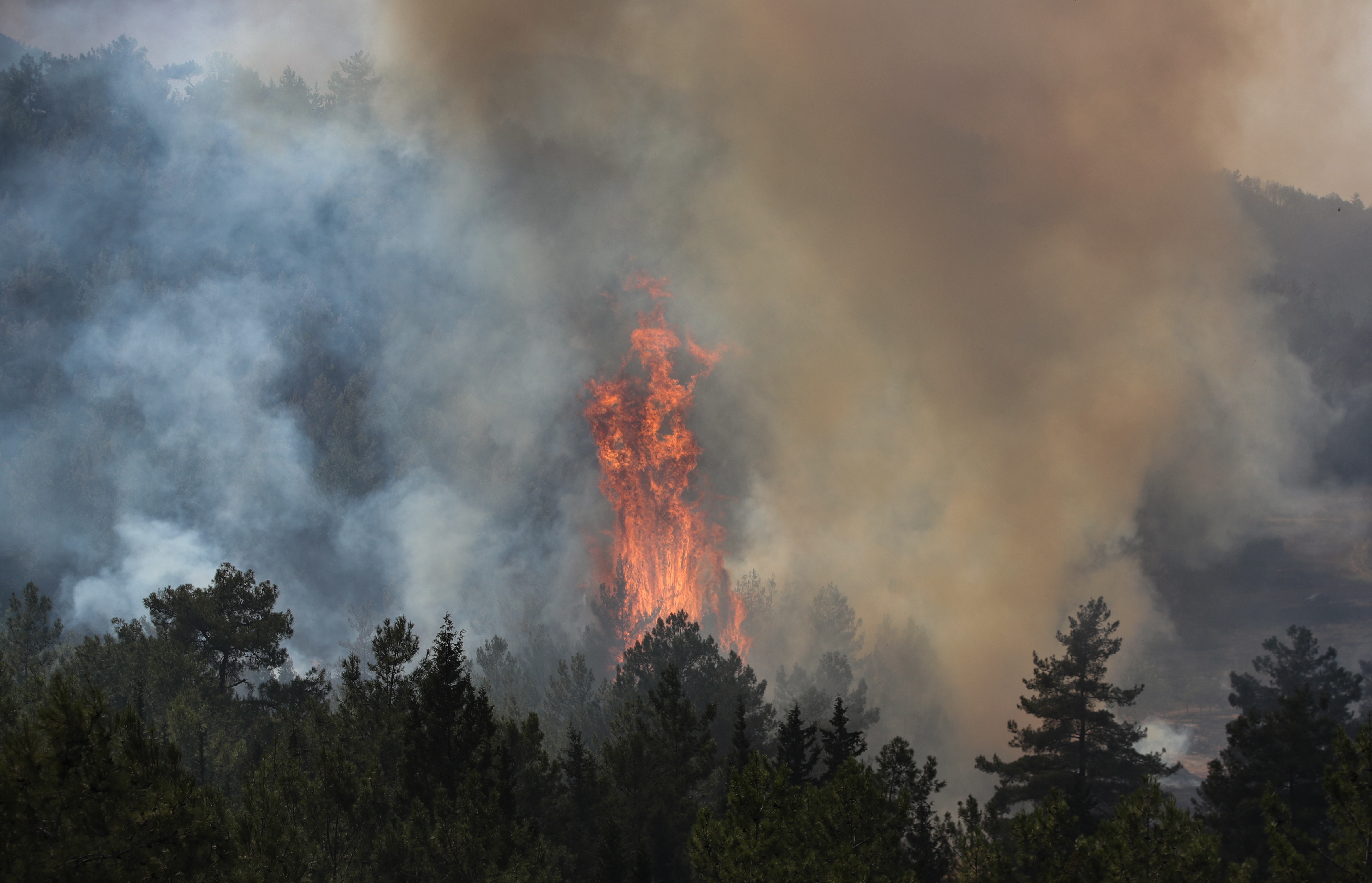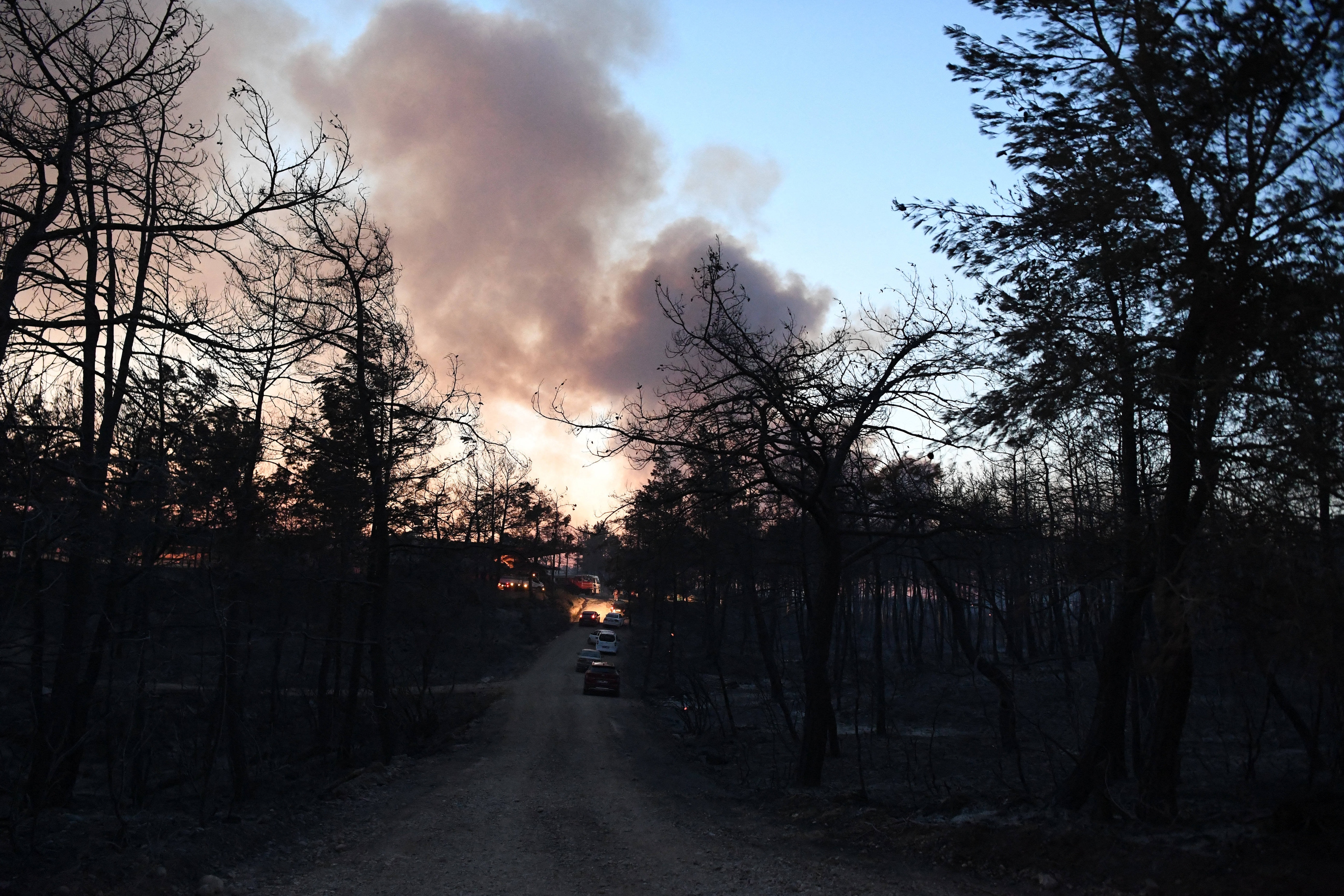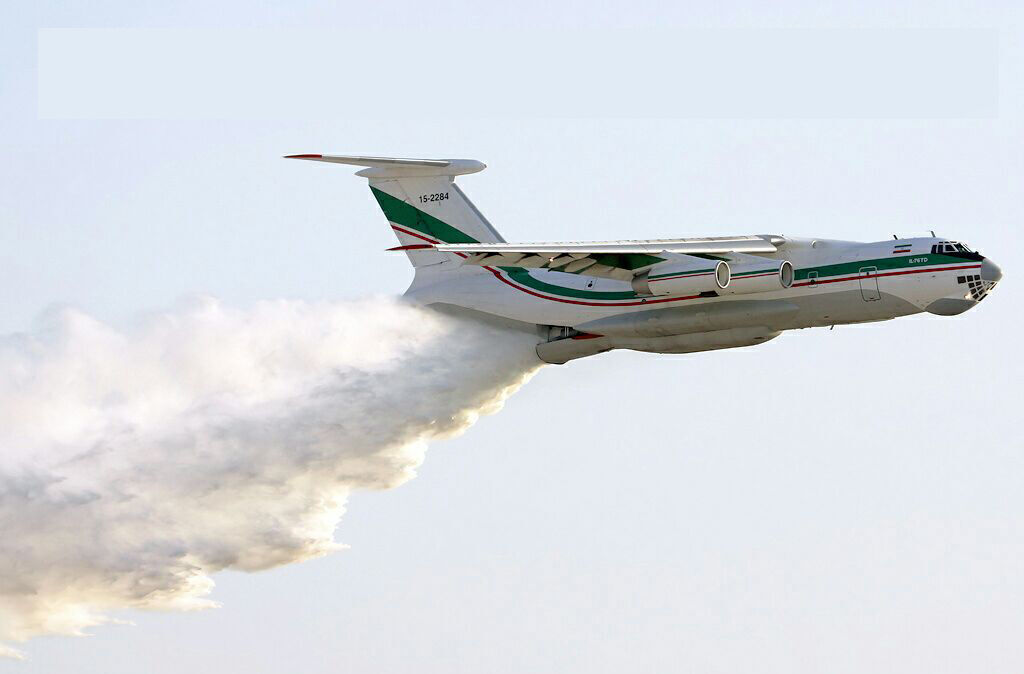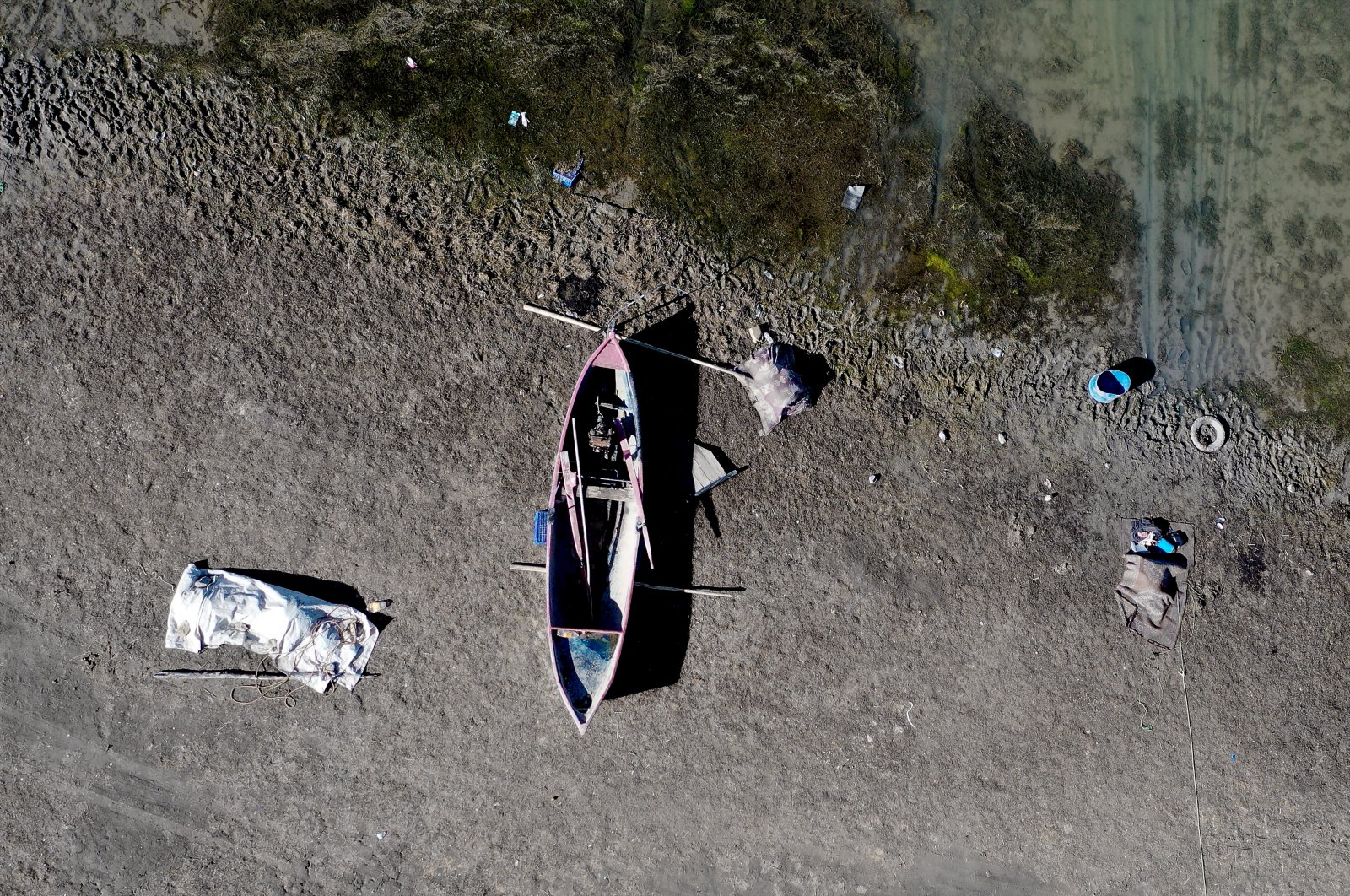
Issued on: 01/08/2021
Ankara (AFP)
Dozens of villages were evacuated in tourist hotspots in southern Turkey on Sunday as wildfires that have claimed six lives raged for the fifth day, while Greece, Italy and Spain were also hit by blazes.
Fanned by soaring temperatures, strong winds and climate change -- which experts say increases both the frequency and intensity of such blazes -- this year's fire season has been significantly more destructive than the previous average, EU data shows.
Turkey is suffering through its worst fires in at least a decade with nearly 95,000 hectares (235,000 acres) burnt so far this year, compared with an average of 13,516 at this point in the year between 2008 and 2020.
A neighbourhood in the tourist city of Bodrum has been evacuated, CNN Turk broadcaster reported, as flames were fanned by strong winds from the nearby Milas district.
Unable to leave by road, 540 residents were taken to hotels by boats, the channel said.
There were more evacuations in the resort city of Antalya, NTV broadcaster reported.
After hitting record levels last month, temperatures are set to remain high in the region.
A temperature of 49.1 degrees Celsius (120.3 Fahrenheit) was recorded in the southeastern town of Cizre on July 20.#photo1
And the mercury is expected to reach 40 degrees Celsius in Antalya on Monday.
Turkey's defence ministry released satellite images showing the extent of the damage, with forest areas turned black and smoke still visible.
President Recep Tayyip Erdogan has been criticised after it emerged that Turkey had no firefighting planes despite one-third of its territory being forested and fires becoming an increasing problem.
According to EU figures, Turkey has been hit by 133 wildfires in 2021 so far compared with an average of 43 by this point in the year between 2008 and 2020.
- Greek 'catastrophe' -
Firefighters were also battling fires in Greece, after a major blaze broke out early Saturday near Patras in the west.
Five villages have been evacuated and eight people hospitalised with burns and respiratory problems in the region, which remains on alert.#photo2
Around 20 homes have been burnt down, according to a provisional figure from the fire brigade.
The mayor of nearby village Aigialeias, Dimitris Kalogeropoulos, called it "an immense catastrophe".
Around 30 houses, barns and stables were consumed by flames in the villages of Ziria, Kamares, Achaias and Labiri.
"We slept outside overnight, terrified that we would not have a house when we woke up," a Labiri resident told Greek TV station Skai.
The seaside resort of Loggos was also evacuated, with nearly 100 residents and tourists sent to the nearby city of Aigio.
According to EU data, 13,500 hectares had been burnt in Greece, compared with an average of 7,500 at this point in the year from 2008-2020.
- 'Crazy summer' -
Italy was again hit by fires after more than 20,000 hectares of forest, olive groves and crops were destroyed by a blaze in Sardinia last weekend.
More than 800 flare-ups were recorded this weekend, mainly in the south, Italy's fire brigade said.#photo3
"In the last 24 hours, firefighters have carried out more than 800 interventions: 250 in Sicily, 130 in Puglia and Calabria, 90 in Lazio and 70 in Campania," the brigade tweeted.
It added that firefighters were still working against blazes in the Sicilian cities of Catania, Palermo and Syracuse.
While the south of Italy has been burning, the north has suffered wild storms.
"The cost of the damage caused throughout the northern Italian countryside by the violent storms and hail during this crazy summer amounts to tens of millions of euros," the Coldiretti agricultural organisation said.
In Spain, dozens of firefighters backed by water-dropping aircraft were battling a wildfire that broke out Saturday afternoon near the San Juan reservoir, about 70 kilometres (40 miles) east of Madrid.
© 2021 AFP


Wildfires near Manavgat at Antalya, Turkey on July 30, 2021. Source: ABACA
Since the fires broke out on Wednesday last week, six people have died and more than 330 have received medical treatment.
Wildfires in southern Turkey forced more people to flee their homes on Sunday as pressure on the government grew over its response to the deadly forest fires.
Turkey has suffered the worst fires in at least a decade, official data show, with nearly 95,000 hectares burned so far this year, compared with an average of 13,516 at this point in the year between 2008 and 2020.
Since the fires broke out Wednesday, six people have died and more than 330 have received medical treatment.
A neighbourhood in the tourist city of Bodrum was evacuated, the CNN Turk broadcaster reported, as flames were fanned by strong winds from Milas district nearby.
Unable to leave by road, 540 residents were taken to hotels by boats, the channel said.

A view of a wildfire burning at a rural area of Marmaris district of Mugla, Turkey, 31 July 2021 EPA
There were more evacuations in the village of Sirtkoy in Antalya province, NTV broadcaster reported, with images of grey smoke clouds enveloping homes.
Agriculture and Forestry Minister Bekir Pakdemirli said 107 of 112 forest fires were now under control, but blazes continued in the holiday regions of Antalya and Mugla.
Temperatures are set to remain high in the region after record levels last month.
The general directorate of meteorology registered a temperature of 49.1 degrees Celsius on July 20 in the southeastern town of Cizre.
The mercury is expected to reach 40 degrees Celsius in Antalya Monday.
Turkey's defence ministry released satellite images showing the extent of the damage with forest areas turned black and smoke still visible.

Burned remains at the Ulukapi Sulek village near the Manavgat region in Antalya.
ABACA
The opposition attacked President Recep Tayyip Erdogan late Saturday after a video showed the leader throwing tea to residents in fire-affected areas.
In another video, he is throwing tea to people on the side of the road from a bus.
"Tea! It's unbelievable. Those who lose their shame, lose their heart too," main opposition Republican People's Party (CHP) spokesman Faik Oztrak tweeted.
The government has also been criticised over the lack of firefighting planes, with Turkey forced to accept help from Azerbaijan, Iran, Russia and Ukraine.
Experts warn climate change will wreak further damage in Turkey, causing more wildfires if necessary measures to tackle the problem are not taken.
According to European Union figures, Turkey has been hit by 133 wildfires in 2021 so far compared to an average of 43 by this point in the year between 2008 and 2020
SOURCE AFP - SBS

Tehran - IRNA - The head of the Air Fire Control and Logistics Center of the Ministry of Defense of Iran said that the Iranian Armed Forces launched the first firefighting operation in large-scale forest fires in southern Turkish provinces.
Pilot Mohammad Mehdi Nouri Al-e Agha said here on Sunday that this operation was launched with the capacity of 40 tons of water after forest fires started in Antalya’s Manavgat district and spread over a large area.
He added that firefighting team and a firefighting aircraft designed by young Iranian experts with a capacity of 40 tons of water arrived in the city of Muğla on Saturday evening, hoping that two more water-spraying helicopters would be deployed to the area the next days to help extinguish more areas and prevent the fire from progressing.

Turkey is fighting multiple wildfires in three provinces. The fires started on Wednesday. At least four people have lost their lives due to the fires, and the number is likely to increase, according to officials.
6125**9417
Follow us on Twitter @IrnaEnglish
BY ANADOLU AGENCY
AUG 01, 2021

A boat sits on a dried-up lakebed in Konya, central Turkey, Aug. 1, 2021. (AA PHOTO)
Konya, the breadbasket of Turkey, is going through tough times with reduced precipitation levels. The ensuing drought has dealt a blow to water levels in dam reservoirs, lakes and ponds and has affected agriculture and animal husbandry in this central province of the country.
Global climate change is the main culprit in the drought that has hit the already arid province particularly hard. Water resources shrink day by day, posing a considerable threat to agricultural irrigation.
Data from the State Hydraulics Works (DSI) show water resources across the province are at their lowest in the last decade. The drought is particularly visible in Beyşehir, the country’s largest freshwater lake, whose levels dropped below a critical threshold. Draining water from the lake for irrigation purposes is banned nowadays due to the reduction in water levels. The same ban applies to Suğla and Ivriz, two dam reservoirs where water levels have dropped significantly. Bağbaşı, a dam that also supplies drinking water to the province, saw water levels dropping to 15%. Altınapa Dam appears to be the only one at the highest level, at 51%, while Apa Dam in the province is now only 4% full.
Professor Süleyman Soylu, an academic from the Faculty of Agriculture at Konya’s Selçuk University, says the Konya plain this year has seen the lowest average precipitation in a few decades and emphasized that it was damaging for agricultural production in particular, pointing out losses in crops. “We always had a low-level drought here, but the subsequent precipitation would restore agricultural production. This year is different, though. Konya had no rainfall at all at times when crops needed rain most. This forced farmers to use extra water for irrigation. This situation caused water stress,” he said. Soylu says most water resources have hit rock bottom and even the deepest water wells have seen their water levels shrink.
“We felt the impact of climate change in the past decade and it changed the periods for cultivation and growth of crops. We need to revise agricultural techniques in parallel with this change. Farmers have to change their irrigation programs and water-saving technologies should be more widespread. Drafting agricultural policies which encourage the cultivation of crops in need of less water is essential,” he said.
Rıfat Kavuneker, head of the Chamber of Agriculture in Konya’s Karatay district, says the Konya plain is in immediate need of water. “Bringing water here from other basins can be costly, but it is of vital importance. You cannot live without water and food. Konya covers 15% of the agricultural production of Turkey. So, this is an issue affecting not just Konya but the entire country,” he said.
No comments:
Post a Comment